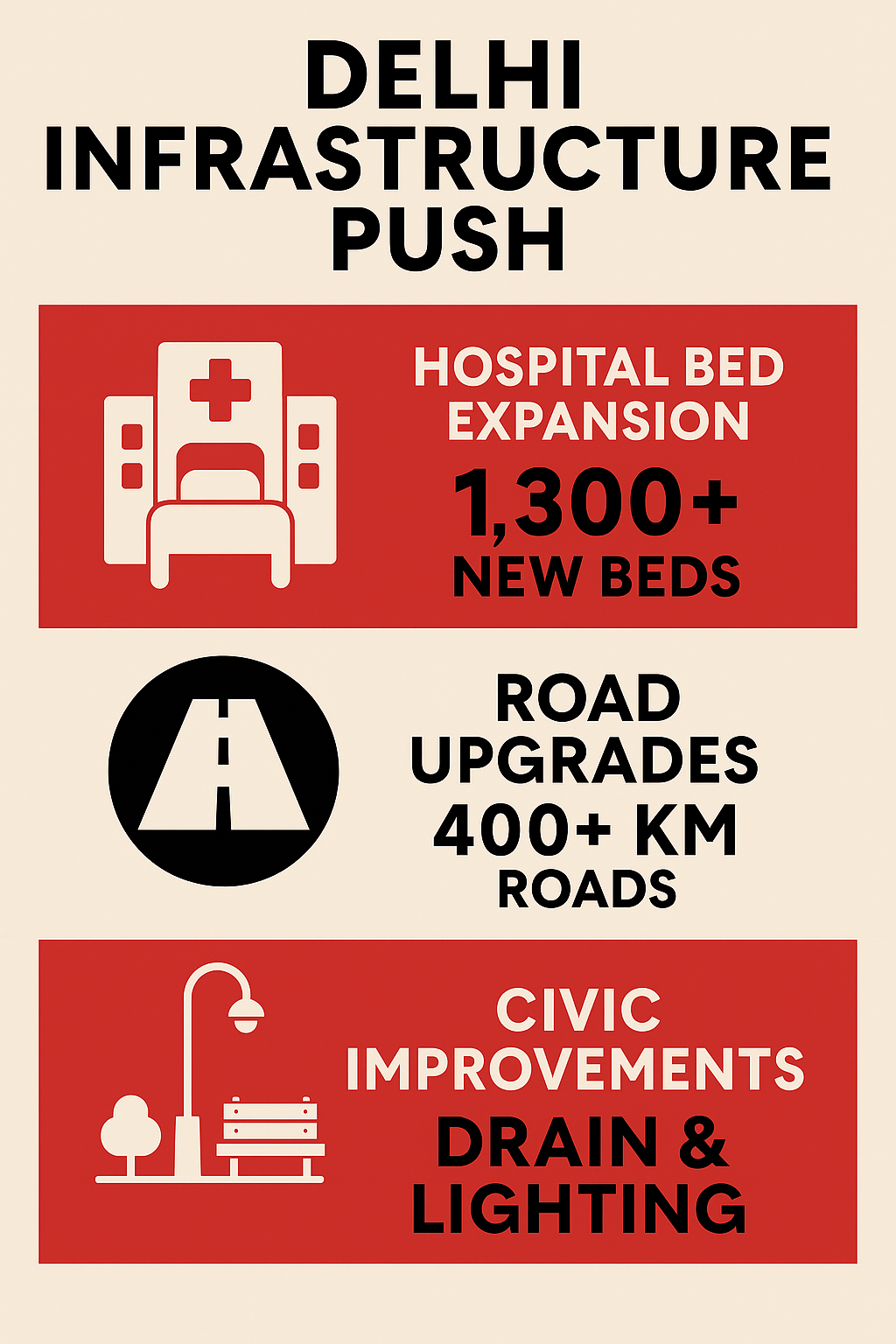Delhi’s government has announced a major infrastructure upgrade, allocating around ₹1,000 crore across health, transport, and civic development. At the core of this initiative are plans to add more than 1,300 hospital beds and upgrade critical road networks. These moves aim to improve public health resilience and ease the daily commute for millions of Delhi residents.
Expanding Hospital Capacity
In a move to strengthen Delhi’s healthcare infrastructure, the government plans to commission over 1,300 new beds across several hospitals within the next two years. Major projects include:
- A ₹332 crore expansion at Gandhi Nagar Hospital to add 500 beds
- ₹202 crore to add 310 beds at Shahdara Hospital
- ₹155 crore upgrade at Madipur Hospital, adding 270 beds
- ₹123 crore allocation for 180 beds at Ambedkar Nagar Hospital
- ₹48 crore investment to enhance capacity at Deen Dayal Upadhyay Hospital
Experts praise the move. Dr. Aarti Menon, a public health specialist based in Delhi, notes, “Adding these beds is vital for meeting peak demand periods, particularly amid seasonal respiratory and dengue outbreaks.” Along with bed capacity, seven hospitals will be developed into superspecialty ICU facilities, and GTB Hospital is expanding ICU beds to meet critical care demand.
Repairing Delhi’s Road Network
Delhi’s Public Works Department has secured ₹953 crore from the Central Road Fund and ₹1,000 crore from the Urban Development Fund to repair over 400 km of roads. Key focal points include Outer Ring Road flyovers at Modi Mill and Savitri Cinema junctions, along with improved connectivity near the Dwarka Expressway corridor.
Delhi Transport Minister Parvesh Verma explains, “Our aim is to address chronic traffic bottlenecks and improve commuter safety.” These projects also include drainage repairs to prevent flooding during peak monsoon seasons.
Improving Civic Infrastructure
Beyond hospitals and roads, the plan allocates ₹38 crore to enhance basic amenities in five densely populated districts. This includes improved street lighting, sanitation, and community service upgrades in older residential neighborhoods.
Urban planner Suresh Rao applauds this balanced approach: “Focusing on local drains and lighting shows attention to everyday quality-of-life—these upgrades matter just as much to residents as big-ticket projects.”
Impact on Residents
Delhiites stand to gain in multiple ways: better healthcare access, smoother and safer roads, and enhanced neighborhood amenities. The addition of hospital beds helps reduce patient wait times, while road and drainage upgrades ensure fewer traffic jams and less waterlogging. Enhanced lighting and sanitation also contribute to safer, more livable communities.
What You Should Know Now
Projects have received budget clearance and are likely to roll out over the next 18–24 months. Hospital expansions include fire safety and modern medical infrastructure, while road upgrades and civic enhancements are prioritized based on existing bottlenecks and citizen feedback.
Government officials emphasize this is not a one-off investment but part of a broader vision to make Delhi more resilient, healthy, and accessible.
Frequently Asked Questions (FAQs)
What is the focus of Delhi’s ₹1,000 crore infrastructure push?
The Delhi government is investing over ₹1,000 crore to add more than 1,300 hospital beds, repair over 400 km of roads, and improve local civic infrastructure such as drainage and lighting.
Which hospitals in Delhi are being upgraded?
Hospitals receiving major upgrades include Gandhi Nagar Hospital (500 beds), Shahdara Hospital (310 beds), Madipur Hospital (270 beds), Ambedkar Nagar Hospital (180 beds), and DDU Hospital. GTB Hospital will see ICU expansion.
How many new beds are being added in total?
Over 1,300 new hospital beds will be added across Delhi, aimed at improving public health capacity and reducing crowding during peak illness seasons.
What roads are being repaired under this plan?
The Delhi PWD plans to repair over 400 km of roads. Key upgrades include flyovers at Modi Mill and Savitri Cinema junctions and improved links to Dwarka Expressway.
When will these projects be completed?
Most of the hospital and road projects are scheduled for completion over the next 18 to 24 months, subject to contractor finalization and ongoing tender processes.
How will this benefit Delhi residents?
The upgrades will reduce hospital wait times, improve emergency care access, ease traffic bottlenecks, and enhance everyday infrastructure like lighting, sanitation, and drainage.
Are there any monsoon-related improvements in the plan?
Yes, drainage system repairs are part of the roadwork strategy to prevent seasonal waterlogging, which is a recurring issue in many parts of Delhi.

